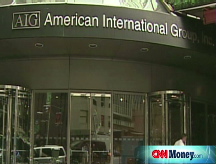Shorts blamed for bank stock plunge
Shares of most big banks nosedived as controversial ban on short selling ended. But bank stocks didn't do well during the ban either.
NEW YORK (CNNMoney.com) -- Bank stocks sank across the board Thursday, leading the broader market in a frenzied selloff. Some market watchers blamed the drop on the expiration of the short selling ban on financial stocks.
The S&P Banking Index plunged more than 13.5% and several leading bank stocks posted double-digit percentage drops, including Goldman Sachs (GS, Fortune 500), Wells Fargo (WFC, Fortune 500), Citigroup (C, Fortune 500), and Bank of America (BAC, Fortune 500).
Wachovia (WB, Fortune 500) and Morgan Stanley (MS, Fortune 500) were particularly hard hit, each falling over 25%. Even JP Morgan (JPM, Fortune 500), heralded as one of the few to successfully navigate the credit crisis so far, fell 7%.
Wachovia has taken a hit as its future remains uncertain. The beleaguered bank, which has seen its shares fall 72% in the past three weeks, is in limbo right now. Citigroup and Wells Fargo have both made offers to buy parts of or all of Wachovia and the two are still feuding over how the assets might be split.
Morgan tumbled 26% as the investment bank continued to be plagued by rumors that Japan's Mitsubishi UFJ (MTU) agreement to buy a 20% stake in Morgan was in jeopardy.
A Morgan spokesman dismissed such rumors, saying the deal will close this coming Tuesday under the same terms announced earlier this week.
Mitsubishi also said in a statement Wednesday morning that the rumors are not true and that it expects the deal to close next Tuesday.
A source familiar with the Morgan-Mitsubishi deal blamed the slide in Morgan Stanley's stock Thursday on the expiration of the short selling ban.
Frank Barkocy, director of research with Mendon Capital Advisors, an investment firm that specializes in bank stocks, also blamed the decline across the financial sector on short selling.
"The resumption of short selling is putting pressure on these stocks," said Barkocy. "The group overall is very weak."
The Securities and Exchange Commission barred stock traders from shorting most financial stocks on Sept. 19 as the credit crisis unfolded. The SEC extended the ban last week and said that if a bank bailout bill was signed into law, the ban would end three business days after that.
Short sellers borrow stock at one price and sell it with the hopes of buying the stock later at a lower price so they can pocket the difference. Some have blamed short sellers for spreading false rumors about banks in order to send the stocks drastically lower.
But the ban was controversial, with some arguing that short sellers do a service to the market by identifying overvalued stocks and that prohibiting short selling was nothing more than an artificial manipulation of the market.
Still, even with the short selling ban in place, bank stocks took a beating. The S&P Banking Index has plunged over 30% since the ban took effect.
Short selling may not be the only thing weighing on bank shares Thursday. The U.S. government is also thinking about buying bank stocks, the White House said.
The move would be an attempt to directly inject capital into banks - which have been starved of cash as homeowners default on mortgages and inter-bank lending dries up.
But banks would issue new shares for the government to purchase, diluting the value of existing shares for current stock holders.
Also, analysts said the government would likely buy shares of the banks facing the most financial trouble, which isn't exactly a vote of confidence for the industry.
"If you own a bank stock, and you think the government might take it over, what do you do?" asked Harry Clark, chief executive of Clark Capital Management. "You sell it." ![]()


